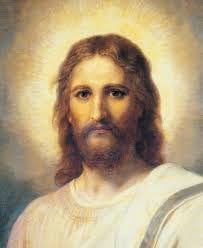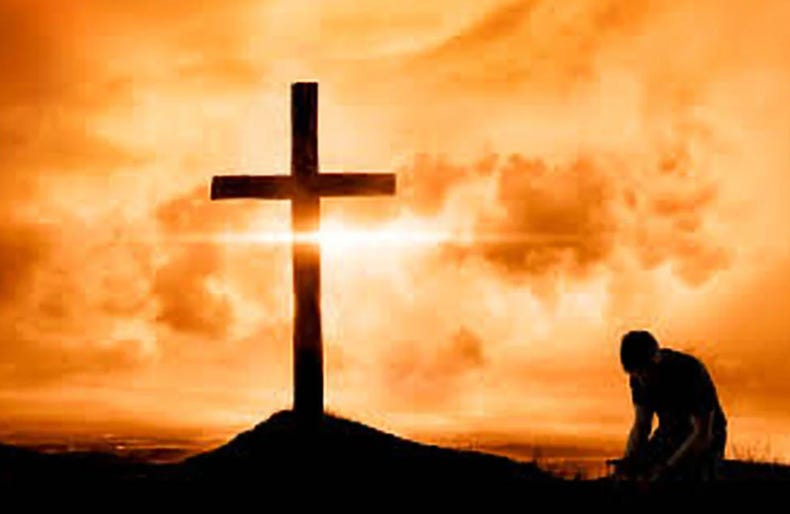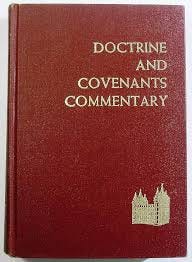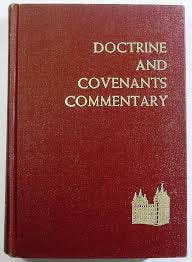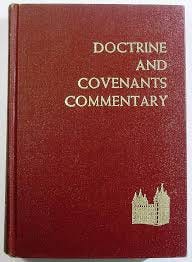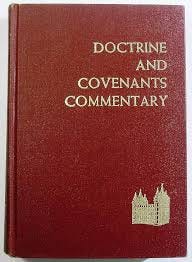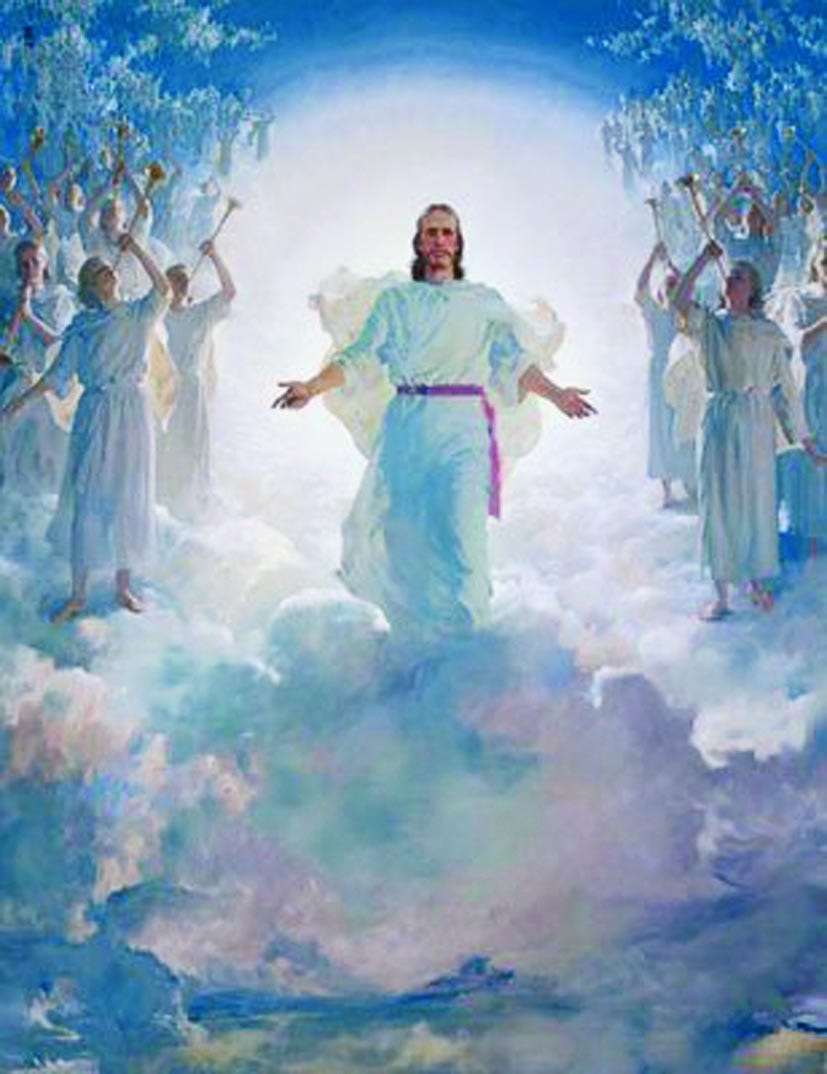He Shall Reward Every Man
Historical Background and Reflections on Doctrine and Covenants 56
In his book The Revelations of the Prophet Joseph Smith, Lyndon W. Cook sheds light on the historical background for Doctrine and Covenants 56:
Date. June 1831 (before leaving for Missouri on 19 June).
Place. Kirtland, Geauga County, Ohio.
Historical Note. At the Church conference held in Kirtland the first week of June 1831, Thomas Marsh was appointed to travel to Missouri with Ezra Thayer. As many as 14 pairs of missionaries had been called to journey to the western boundaries of the United States, preaching along the way. Preparations were being made by the elders to leave Kirtland in mid-June.
A small snag developed, prior to the departure of the missionaries, when Elder Marsh’s companion, Ezra Thayer, indicated that he would not be making the trip west. It is difficult to ascertain all the details of the problem, but Thayer’s investment in a piece of real estate lay at the heart of the matter. The property was being shared by at least three parties, and apparently Thayer was requesting a division be made to secure his interests (see verse 9).
Section 56 was received in response to Thomas Marsh’s concern over his mission. The essentials of the problem were later recorded by Elder Marsh:
“In June 1831 I was ordained a High Priest at a Conference held in Kirtland, where I received an appointment to go to Missouri with Ezra Thayer and preach by the way. In consequence of Ezra Thayer delaying so long, I went to Joseph who received the word of the Lord appointing Selah J. Griffin with whom I journeyed to Missouri preaching by the way.”
Griffin had earlier been assigned to travel with Newel Knight, but when the Colesville Branch at Thompson, Ohio were ejected from Leman Copley’s land, Knight led the group to Jackson County, Missouri.
Verse 8 refers to a “former commandment” which Ezra Thayer had received regarding the property in question. The unpublished revelation, received for Joseph Smith, Sr., and Ezra Thayer, gives insight into the historical setting of section 56:
“Hearken unto my words and behold I will make known unto you what ye shall do as it shall be pleasing unto me for verily I say unto you it must needs be that ye let the bargain stand that ye have made concerning those farms until it be so fulfilled behold ye are holden for the one even so likewise thine advisary is holden for the other. Wherefore it must needs be that ye pay no more money for the present time until the contract be fulfilled and let mine aged servant Joseph and his family go into the house after thine advisary is gone and let my servant Ezra board with him and let all the brethren immediately assemble together to put up an house for my servant Ezra and let my servant Fredericks family remain and let the house be prepared and their wants be supplied and when my servant Frederick returns from the west behold and lo he desireth to take his family in mine own due time unto the west let that which belongeth unto my servant Frederick be secured unto him by deed or bond and thus he willeth that the brethren reap the good thereof let mine aged servant Joseph govern the things of the farm and provide for the families and let him have healp in as much as he sandeth in need let my servant Ezra humble himself and at the conference meeting he shall be ordained unto power from on high and he shall go from thence (if he be obedient unto my commandments) and proclaim my gospel unto the western regions with my servants that must go forth even unto the borders of the Lamanites for behold I have a great work for them to do and it shall be given unto you to know what ye shall do at the conference meeting even so amen.
What shall the brethren do with them monies. Ye shall go forth and seek dilligently among the brethren and obtain lands and save the money that it may be consecrated to purchase lands in the west for an everlasting inheritance even so Amen.
Publication Note. Section 56 was first published as chapter 58 in the Book of Commandments in 1833. (pp. 89-91)
As noted in McConkie’s section heading, this revelation was given through the Prophet Joseph Smith in Kirtland, Ohio, on June 15, 1831. The Lord chastised Ezra Thayre for not obeying a former revelation (the commandment referred to in verse 8). In this former revelation the Lord instructed Thayre concerning his duties on Frederick G. Williams’ farm, where he lived. The following revelation also revokes Thayre’s call to travel to Missouri with Thomas B. Marsh (see section 52:22).
Let’s examine, appreciate, and assimilate this revelation a piece at a time:
Hearken, O ye people who profess my name, saith the Lord your God; for behold, mine anger is kindled against the rebellious, and they shall know mine arm and mine indignation, in the day of visitation and of wrath upon the nations.
And he that will not take up his cross and follow me, and keep my commandments, the same shall not be saved.
Behold, I, the Lord, command; and he that will not obey shall be cut off in mine own due time, after I have commanded and the commandment is broken. (D&C 56:1-3)
The Lord has very high standards and He cannot be deceived. He knows the difference between those who sincerely take upon them His name and those who merely profess His name. Ezra Thayre had been rebellious and therefore the Lord rebuked him for his pride and selfishness. If we truly desire to be disciples of Jesus Christ and be saved we must take up His cross, follow Him, and keep His commandments. The Lord is perfectly merciful, but He will eventually cut off the disobedient.
Smith and Sjodahl commentary on this section and these verses is helpful:
One more Revelation was given before the Prophet Joseph and companions started upon the epoch-making journey to the western part of Missouri. It was given at the solicitation of Thomas B. Marsh. In this Revelation the Lord (1) declares His anger against the rebellious (1-3); (2) sets forth His freedom of action (4-7); (3) calls Ezra Thayre to repentance (8-11); (4) assures the Prophet that He will provide (12-13); (5) calls the Saints to repentance (14-17); and (6) promises blessings to the pure in heart (18-20).
God’s Anger Against the Rebellious.
Mine anger is kindled] The Lord has, on several occasions declared His anger against the rebellious (Comp. 1:13; 5:8; 19:5, and many other passages). Those who believe in a God without passions must deny that He can feel anger, and love too, for that matter, but the Word of God is clear on this point. Sin and wickedness kindle the anger of the Lord, when persisted in. But the great difference between the divine passion and that of man is this, that in God’s anger there is no element of malice. It is the “wrath of the Lamb” (Rev. 6:16).
In the day of visitation] The rebellious will come under the wrath of God, when it is poured out upon the nations.
He that will not follow me *** not be saved] The commandments of God are all given for our salvation; if we do not keep them, we are lost. When a ship is sinking, the orders of the captain must be obeyed implicitly. Disobedience by the crew might mean the loss of ship and all. Noah could not have been saved except by building the Ark. “According to all that God commanded him, so did he” (Gen. 6:22). That was his salvation. It is so now. The salvation of the world is possible only by obedience to the commandments of God.
Shall be cut off] All who are disobedient will be “Cut off” in the due time of the Lord, when a divine commandment has been given and broken, without true repentance following. God does not condemn man for trespassing in ignorance, but for willful sin against the light offered, as Paul declared at Athens, “The times of ignorance God winked at [overlooked], but now commandeth all men everywhere to repent” (Acts 17:30). (pp. 320-321)
Wherefore I, the Lord, command and revoke, as it seemeth me good; and all this to be answered upon the heads of the rebellious, saith the Lord.
Wherefore, I revoke the commandment which was given unto my servants Thomas B. Marsh and Ezra Thayre, and give a new commandment unto my servant Thomas, that he shall take up his journey speedily to the land of Missouri, and my servant Selah J. Griffin shall also go with him.
For behold, I revoke the commandment which was given unto my servants Selah J. Griffin and Newel Knight, in consequence of the stiffneckedness of my people which are in Thompson, and their rebellions.
Wherefore, let my servant Newel Knight remain with them; and as many as will go may go, that are contrite before me, and be led by him to the land which I have appointed. (D&C 56:4-7)
The sins of the rebellious and stiffnecked cause many problems. Mission companionships and missions themselves may be altered by rebelliousness and stiffneckedness. The Lord commands and revokes according to His wisdom and timing, to the blessing of the obedient, and to the condemnation of the rebellious. Smith’s and Sjodahl’s commentary on these verses is helpful, but I cite only a portion of it here:
Let my servant Newel Knight remain with them] Instead of proceeding to Missouri immediately, Knight was to remain with the Saints at Thompson long enough to organize a company which he should lead to the Promised Land. He performed this duty well, for about a week after the arrival of the Prophet Joseph in Independence, a company of Colesville Saints, who had lived at Thompson temporarily, arrive and settled in Kaw Township, not far from the site of Kansas City. (p. 322)
The revelation continues:
And again, verily I say unto you, that my servant Ezra Thayre must repent of his pride, and of his selfishness, and obey the former commandment which I have given him concerning the place upon which he lives.
And if he will do this, as there shall be no divisions made upon the land, he shall be appointed still to go to the land of Missouri;
Otherwise he shall receive the money which he has paid, and shall leave the place, and shall be cut off out of my church, saith the Lord God of hosts;
And though the heaven and the earth pass away, these words shall not pass away, but shall be fulfilled. (D&C 56:8-11)
I need Smith’s and Sjodahl’s help to better understand the historical background for these verses:
Ezra Thayre Called to Repentance.
Must repent] Ezra Thayre, undoubtedly, was, to some extent, responsible for the failure of the Colesville Saints to organize themselves under the law of consecration, but the Lord did not cast him off without giving him another chance. If he would obey the Lord with regard to the land on which he lived, he would still have a chance of going to Missouri (v. 9).
There shall be no divisions made upon the land] This phrase, says B. H. Roberts, “undoubtedly has reference to the lands upon which Ezra Thayre was living at Thompson, and which he had covenanted, under some arrangement for compensation, to grant to the Churhc, and which contract he attempted, at least, to repudiate” (Hist. of the Church, Vol. I., p. 188).
Otherwise he shall receive the money which he has paid] He would not lose money by persisting in rebellion, but he would lose the companionship of the brethren, as Lot lost the companionship of Abraham, when he went to dwell in Sodom. He must have repented, for in 1834 he held the position of High Priest. He was also a member of Zion’s Camp, an organization formed for the purpose of assisting the Saints who had been driven out of Jackson County, Mo. He was one of the first who were stricken with cholera on the 21st of June, 1834, before the organization was disbanded. (p. 323)
I am grateful that Ezra Thayre repented of his pride and selfishness, and that he was not cut off out of the Lord’s Church. Although the vast majority of modern latter-day Saints are among the best people I know, I also know some modern latter-day Saints who make Ezra Thayre’s pride and selfishness look like deep humility and heartfelt charity. In fact, widespread peace and prosperity in modern America has produced legions of Saints who might give Ezra Thayre a run for his money in terms of his pride and selfishness. I hope that they too will repent, and as all men need repentance, I hope that we will all repent.
The revelation continues:
And if my servant Joseph Smith, Jun., must needs pay the money, behold, I, the Lord, will pay it unto him again in the land of Missouri, that those of whom he shall receive may be rewarded again according to that which they do;
For according to that which they do they shall receive, even in lands for their inheritance. (D&C 56:12-13)
I need Smith’s and Sjodahl’s help again with the historical background for these verses:
God Will Provide.
If my servant Joseph Smith, Jr. must needs pay] If the money to be returned to Ezra Thayre (v. 10) was to be furnished by the Prophet Joseph Smith, the Lord would refund it to him in Missouri. The meaning seems to be that anybody who would, by contributions, enable the Prophet to discharge whatever financial obligations remained as a result of the annulling of the agreements with the Colesville Saints, would be rewarded by receiving land in Missouri, according to the contributions made.
“For, according to that which they do, they shall receive.”
Joseph Smith was not getting rich by doing the Lord’s work. In fact, he struggled financially during his entire life. Joseph Smith had followed Moroni’s admonition regarding the gold plates, and his primary motive was always that of building the kingdom of God:
I beheld the same messenger at my bedside, and heard him rehearse or repeat over again to me the same things as before; and added a caution to me, telling me that Satan would try to tempt me (in consequence of the indigent circumstances of my father’s family), to get the plates for the purpose of getting rich. This he forbade me, saying that I must have no other object in view in getting the plates but to glorify God, and must not be influenced by any other motive than that of building his kingdom; otherwise I could not get them. (JS-History 1:46)
Strangely, much of what I have observed in the modern Church of Jesus Christ of Latter-day Saints seems to reflect the exact opposite of Joseph Smith’s pure motive of building the Kingdom of God. It isn’t just that the prosperity gospel is preached in the Church, but that Saints are actually encouraged and incentivized to seek first for riches, wealth, power, prominence, and position, and only as an afterthought to consider what they can do for the Kingdom of God. Of course there’s nothing inherently wrong with being a business executive, a physician, or a lawyer, but I wonder how many Ezra Thayres the Church produces in modern times. The revelation in D&C 56 is even more relevant now than it was in 1831 when it was given.
The revelation continues:
Behold, thus saith the Lord unto my people—you have many things to do and to repent of; for behold, your sins have come up unto me, and are not pardoned, because you seek to counsel in your own ways.
And your hearts are not satisfied. And ye obey not the truth, but have pleasure in unrighteousness.
Wo unto you rich men, that will not give your substance to the poor, for your riches will canker your souls; and this shall be your lamentation in the day of visitation, and of judgment, and of indignation: The harvest is past, the summer is ended, and my soul is not saved!
Wo unto you poor men, whose hearts are not broken, whose spirits are not contrite, and whose bellies are not satisfied, and whose hands are not stayed from laying hold upon other men’s goods, whose eyes are full of greediness, and who will not labor with your own hands! (D&C 56:14-17)
If the Lord rebuked His early Saints for these sins and vices, people who had comparably little in terms of worldly wealth, I can only imagine how much more sternly He might rebuke His modern Saints for the same sins and vices. The Lord’s rebuke covers all the bases. In case they thought that they had no need of repentance, the Lord enumerated exactly which sins His people must repent of:
Preferring their own counsel above God’s counsel
Unsatisfied hearts
Disobedience to the truth
Pleasure in unrighteousness
Among the rich, selfishness and withholding substance from the poor
Among the poor, pride, greed, and sloth
Smith’s and Sjodahl’s commentary on these verses is helpful:
The Saints Called to Repentance.
Many things to do and to repent of] “To do and to repent” are inseparably connected. Repentance is primarily a change of mind (metanoya), but it is a change of mind that produces a change from wrong conduct. For instance, “A certain man had two sons; and he came to the first and said, Son, go work today in my vineyard. He answered and said, I will not; but afterwards repented and went” (Matt. 21:28, 29). That was genuine repentance. The word in Romans 11:29 (metameleia), translated “repentance,” means “regret,” or a “change of plan,” without implying a change of mind.
True repentance is both a change of mind and of conduct.
Repentance is not accomplished once for all. It is a spiritual experience that is completed only when this Earthly existence is ended. For, no matter how far advanced we may be, there is always something to better, something to improve, and the first step to improvement is repentance. The Saints always “have many things to do and to repent of,” until they reach the stage of perfection. Our Lord, who told Peter, the Apostle, that he had yet to be converted (Luke 22:32), also taught the Colesville Saints that they, though members of the Church, had many things to repent of.
Your sins have come up unto me] This refers to the sin of not organizing under the law of consecration. Those who were responsible for the failure to do so had not been pardoned, because they preferred their own counsel to that of God.
Truth *** unrighteousness] The law of consecration represents truth. They refused to obey it. The order adopted by the world is more adapted to the practice of unrighteousness. That they delighted in.
Wo unto you rich men] In this and the following verse the Lord indicates the main reasons why the United Order cannot be practiced on Earth at present. The rich are not willing to serve the poor with their substance. They love mammon, not their fellowmen.
Wo unto you poor men] But not only the rich are to blame. The poor are also responsible, for many of them are not humble, nor honest. Many of them are dishonest; many are as greedy. as any miser, and many are lazy, or given to violence on the slightest provocation. A United Order cannot be built up of mammon-slaves and belly-worshipers, be they rich or poor. Both classes must repent, and enter upon a new life before the highest ideal of a human society can be realized. Compare James 5:1-9. St. James tells the rich, to whom he wrote, that they had been so foolish as to heap up for themselves a treasure in “the last days.” They were living in the last days of the Mosaic dispensation when that was written, and in the chaos attendant upon the cataclysm in which the old dispensation expired, the treasures heaped up were of but little use to the possessors. Wealthy Jews, when Jerusalem fell, were first marked out for torture and plunder. Again, the world is passing through the last days of a dispensation. When the vials of wrath are poured out, gold will bring but small comfort. (pp. 324-325)
The revelation continues and concludes:
But blessed are the poor who are pure in heart, whose hearts are broken, and whose spirits are contrite, for they shall see the kingdom of God coming in power and great glory unto their deliverance; for the fatness of the earth shall be theirs.
For behold, the Lord shall come, and his recompense shall be with him, and he shall reward every man, and the poor shall rejoice;
And their generations shall inherit the earth from generation to generation, forever and ever. And now I make an end of speaking unto you. Even so. Amen. (D&C 56:18-20)
The disposition of both the rich and the poor toward the things that matter most depends upon the condition of the heart. Our Lord has pronounced blessings upon the pure in heart in many passages of scripture, including this one. Broken hearts and contrite spirits receive Jesus Christ, and the pure in heart shall see God. The Lord shall deliver the poor who are pure in heart, whose hearts are broken, and whose spirits are contrite. Not only this, but they, the meek, shall inherit the fatness of the earth. No longer will the rich who have preyed upon the poor prosper. The tides will change, the circumstances will be reversed. As Isaiah put it:
Every valley shall be exalted, and every mountain and hill shall be made low: and the crooked shall be made straight, and the rough places plain:
And the glory of the Lord shall be revealed, and all flesh shall see it together: for the mouth of the Lord hath spoken it. (Isaiah 40:4-5)
Unlike the governments, institutions, and systems of the earth, the Lord is perfectly just. He shall come, and His recompense shall be just. He shall justly reward every man, rich or poor, according to his works. The Prophet Joseph Smith taught:
The great designs of God in relation to the salvation of the human family are very little understood by the professedly wise, and intelligent generation in which we live; various and conflicting are the opinions of men concerning the plan of salvation; the requisitions of the Almighty; the necessary preparations for heaven; the state and condition of departed spirits; and the happiness, or misery that is consequent upon the practice of righteousness and iniquity according to their several notions of virtue, and vice. The Mussulman condemns the Heathen, the Jew, and the Christian, and the whole world of mankind that reject his Koran as infidels, and consigns the whole of them to perdition, the Jew believes that the whole world that rejects his faith, and are not circumcised, are gentile dogs, and will be damned. The Heathen are equally as tenacious about their principles, and the Christian consigns all to perdition who cannot bow to his creed, and submit to his ipse dixit.
But while one portion of the human race are judging and condemning the other without mercy, the great parent of the universe looks upon the whole of the human family with a fatherly care, and paternal regard; he views them as his offspring; and without any of those contracted feelings that influence the children of men, causes “his sun to rise on the evil and the good; and sends his rain on the just and unjust.” He holds the reigns of judgment in his hands; he is a wise lawgiver, and [HC 4:595] will judge all men -[not according to the narrow, contracted, notions of men, but]- “according to the deeds done in the body whether they be good or evil;” or whether these deeds were done in England, America, Spain, Turkey, or India; he will judge them “not according to what they have not, but what they have;” those who have lived without the law, will be judged without law, and those who have a law, will be judged by that law;
We need not doubt the wisdom and intelligence of the great Jehovah, he will award judgment or mercy to all nations according to their several deserts, their means of obtaining intelligence, the laws by which they are governed; the facilities afforded them of obtaining correct information; and his inscrutable designs in relation to the human family: and when the designs of God shall be made manifest, and the curtain of futurity be withdrawn, we shall all of us eventually have to confess, that the Judge of all the Earth has done right. (Joseph Smith, History, 1838–1856, volume C-1 [2 November 1838–31 July 1842])
Blessed are the poor who are pure in heart, for they will inherit the earth. Because they are humble, they shall be lifted up. When Christ comes again, the poor shall rejoice, and the Lord shall bless their generations to inherit the earth from generation to generation, forever and ever. This is a greater blessing than all the riches of the world could ever buy.







